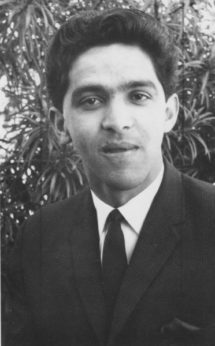
JOHANNESBURG, South Africa — It’s taken 46 years for some sort of justice to prevail in the case of Ahmed Timol, the anti-apartheid activist killed in police custody when South Africa was under racist white rule.
Timol was a member of the South African Communist Party (SACP), which was banned by the apartheid regime. In October 1971, he was arrested for being in possession of Communist Party leaflets. A few days later, he was dead.
An inquest held in 1972 found that he had committed suicide by jumping from the tenth floor of the main police station in Johannesburg, then called John Vorster Police Station. The court exonerated the security police, who had been interrogating Timol, from any wrongdoing. It even ruled that Timol had been treated with compassion by the cops.
But on Thursday, Oct. 12, the High Court sitting in Pretoria ruled that Timol had been brutally tortured up to his death by teams of secret police interrogators working in relay, and that he was pushed or thrown from the tenth floor or the roof of the police station.
Judge Billy Mothle told the court: “Timol did not jump out of the window of room 1026 but was either pushed out of the window or from the roof of the John Vorster Police Station. Thus he did not commit suicide but was murdered.”
The judge said the security police went to great lengths to conceal the truth of Timol’s death, but left gaping anomalies that were uncovered during the re-examination of the case.
One was the assertion that Timol had dived out of the police station window after having distracted his interrogators—a physical impossibility, not least for someone incapacitated by days of torture.
“The sub-standard and sloppy manner in which the investigation of Timol’s death was conducted supported the view that there was clear intent to cover up the incident through a fabricated version of suicide.”
The new inquest was the result of efforts over many years by the Timol family to review the 1972 judgment.

Under the apartheid regime, which was waging a prolonged battle against a broad liberation movement fighting for equality and political freedom, the judiciary regularly connived with the security police to cover up political murders, many of them carried out at notorious John Vorster police station.
Most of those involved in Timol’s interrogation and killing are now dead, and never had to answer for their crime. The mendacious verdict of the original inquest that “no living person” killed Timol carries an ironic truth today. Only one of the police officers who was with Timol before he died is alive today. He stuck to the cover-up story of the 1972 inquest verdict and is now liable for prosecution.
The new inquest, which opened at the end of June, was hampered by the incomplete record of the original inquest. Some 600 pages of the 1000-page court record had disappeared by the time the Timol family had managed to get hold of it by court order.
The missing material covered all the police testimony given at the 1972 hearing. Despite this, Judge Mothle pointed out in his ruling, there was sufficient new evidence to cast doubt on the 1972 verdict.
He said that the findings of the new Timol inquest open the way for inquests into some 400 other deaths at the hands of the security police during apartheid that were either never accounted for or covered up.
For advocate Howard Varner, who represented the Timol family in court, the case exposes the ugly connivance by the police under apartheid to conceal their crimes. But, as Varner wrote recently, it also exposes “a shameful story of great neglect, as the authorities in our new democratic order failed or declined to take action while the key suspects were still alive.”
Following the new ruling on Timol’s death, the SACP stated that it “unwaveringly supports the Timol family and will deepen its campaign towards a wider program to seek justice for all. Everyone who was killed by or disappeared at the behest of the apartheid regime must be accounted for.”










